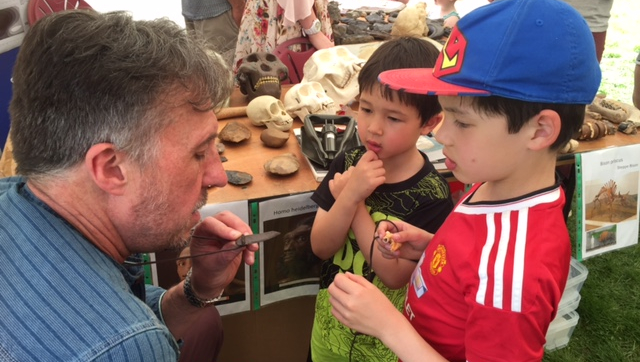Researchers presenting their work at the recent Bath Festival of Nature say that engaging with the public helps inform their research by exploring new avenues they hadn’t thought of. They also mention it helps to keep their research relevant to people’s lives.
From fruit flies to fossils, researchers from the Faculties of Science, Humanities & Social Sciences and Engineering & Design showed their research to the public at Bath’s Festival of Nature – the UK’s largest free celebration of the natural world.
Families and nature lovers visiting the Festival at Green Park in Bath on Saturday 2 June were invited by researchers from the University’s Milner Centre for Evolution to become fossil detectives for the day and bring their own fossils for experts to identify and put on a giant timeline.
Visitors also got the chance to meet giant millipedes, stick insects and locusts, and take part in an experiment investigating how fruit flies protect themselves from infection using their gut rather than their immune system.
There were also researchers from the University’s Research Unit for Water, Environment and Infrastructure Resilience who gave visitors the chance to operate a remote-controlled mini submarine (ROV) , view pond life under a microscope and demonstrated the effects of flooding.
Dr Chrysoula Papacharalampou from the Department of Architecture & Civil Engineering said: “Doing public engagement enables us as researchers to make more relevant research.
“My research is about flooding of the river Avon in Bath. Today we’re demonstrating to children how water systems work and how we can avoid flooding naturally with vegetation or soil.”
Dr Lukas Wolf from the University’s Department of Psychology used the Festival as an opportunity to collect data, inviting visitors to take part in research on whether people behaved in a more environmentally-conscious way if they thought about the impact on future generations.
He said: “We wanted to both collect some data and at the same time have a public engagement activity to get people interested in the type of research we’re doing.”
Head of the University’s Public Engagement Unit, Dr Helen Featherstone said: “Public Engagement is all about bridging the gap between researchers and civic society.
“We want to get our researchers out of the lab at the top of the hill and to get them more involved with the local community.”
Dr Nick Priest, from the Milner Centre for Evolution, said: “Every time I do a public engagement event I’m surprised by something new. Sometimes people suggest new ideas you haven’t previously thought of.
“You don’t really know what’s going to happen at a public event, but something invariably does!”
To find out more about opportunities to engage the public in your research, please visit the Public Engagement Unit’s pages: http://www.bath.ac.uk/public-engagement or join the University’s Public Engagement Network to receive a monthly newsletter.

